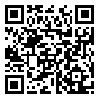

BibTeX | RIS | EndNote | Medlars | ProCite | Reference Manager | RefWorks
Send citation to:
URL: http://jdisabilstud.org/article-1-2011-en.html
2- Payam Noor University of Golestan
Background & Objectives: Children, like other society members, require a mental health, emotion, action, and coping with everyday life problems. The main group of students who need special attention is students with special learning disabilities. A group of students with special learning disabilities is dyslexic students. Dyslexia as a disorder of spelling and reading is more frequent in children with special learning disabilities. Besides, these children have no problem speaking, and their defects concern reading and comprehension skills. Students with dyslexia encounter difficulty reading and related problems; thus, they need enough support to get through their childhood, adolescence, and academic problems with minimal failure and psychological distress. However, if they receive inadequate support, they may drop out of school; accordingly, they might be prone to delinquency, crime, substance abuse, etc.; therefore, the present study aimed to compare the understanding of teacher support, self–handicapping, and academic meaning between healthy and dyslexic students.
Methods: This was a descriptive causal–comparative study. The study's statistical population included all healthy and dyslexic students in the second year of the elementary school in Gorgan City, Iran, in 2019–2020. The study sample consisted of 56 students (28 students without dyslexia & 28 students with dyslexia). The research sample was selected by purposive sampling method from all dyslexic students; non–dyslexic students were selected by simple random sampling method. The study's inclusion criteria included dyslexia; willingness to participate in the study; having moderate and higher intelligence (IQ: ≥100 determined by the Raven IQ test), and no other disorders. The exclusion criterion included dissatisfaction with continuing cooperation. All study subjects were informed that their presence in the study is optional and their information will remain confidential, and only the results will be reported. To collect the necessary data, the Colorado Learning Difficulties Questionnaire (CLDQ) (Willcutt et al., 2011), Perceived Teacher Support Questionnaire (Metheny et al., 2008), Academic Meaning Questionnaire (Henderson–King & Smith, 2006), and Academic Self–Handicapping Scale (Urdan & Midgley, 2001) were applied. Moreover, data analysis was performed by descriptive statistics (mean & standard deviation) and inferential statistics, including Multivariate Analysis of Variance (MANOVA) in SPSS at the significance level of 0.05.
Results: The obtained results indicated that in the understanding of teacher support (guidance; p<0.001, positive attention; p<0.001, expectations; p=0.002, & accessible; p<0.001), self–handicapping (p<0.001) and academic meaning (p<0.001), there was a significant difference between the students with and without dyslexia. In other words, the rate of self–disability was higher in students with dyslexia, and the level of teacher support and academic meaning was higher in students without dyslexia. Additionally, according to the presence of Partial Eta Squared in each of the variables of understanding teacher support (guidance, positive attention, expectations, & accessibility), 0.45, 0.31, 0.15, and 0.51, self–handicapping (0.44) and academic meaning (0.42) were obtained in two groups.
Conclusion: Based on the collected findings, dyslexic students, although they have above–average IQ, are unable to progress like students without dyslexia and feel incapable as long as they can not enjoy the support of the teacher. This inability is a prelude to creating a negative feeling about education and academic failure.
| Rights and permissions | |
 |
This work is licensed under a Creative Commons Attribution-NonCommercial 4.0 International License. |


